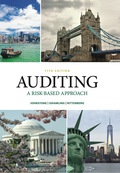
EBK AUDITING: A RISK BASED-APPROACH
11th Edition
ISBN: 9781337670203
Author: RITTENBERG
Publisher: YUZU
expand_more
expand_more
format_list_bulleted
Question
Chapter 8, Problem 21RQSC
To determine
Introduction:
Requirement 1
Determine the sample size.
To determine
Introduction: For selecting the samples from population, auditor should follow some haphazard technique for selection.
Requirement 2
Selection of sample.
To determine
Introduction: The misstatement is an error in account transactions and it is used to evaluate the sample results.
Requirement 3
Determine the sample results.
Expert Solution & Answer
Want to see the full answer?
Check out a sample textbook solution
Students have asked these similar questions
Explain how judgement is used in statistical and non-statistical sampling in an audit service
What is stratification? What are the benefits to the audit team of stratifying the sample?
In auditing, can anyone who uses sampling such as statistical and non-statistical sampling be absolutely sure that the sample is representative of the population from which it is drawn?
Please provide references if any.
Chapter 8 Solutions
EBK AUDITING: A RISK BASED-APPROACH
Ch. 8 - Prob. 1CYBKCh. 8 - Prob. 2CYBKCh. 8 - Prob. 3CYBKCh. 8 - Prob. 4CYBKCh. 8 - Prob. 5CYBKCh. 8 - Prob. 6CYBKCh. 8 - Prob. 7CYBKCh. 8 - Prob. 8CYBKCh. 8 - Prob. 9CYBKCh. 8 - Prob. 10CYBK
Ch. 8 - Prob. 11CYBKCh. 8 - Prob. 12CYBKCh. 8 - Prob. 13CYBKCh. 8 - Prob. 14CYBKCh. 8 - Prob. 15CYBKCh. 8 - Prob. 16CYBKCh. 8 - Prob. 17CYBKCh. 8 - Prob. 18CYBKCh. 8 - Refer to Exhibit 8.6. Assume a 5% risk of...Ch. 8 - Prob. 21CYBKCh. 8 - Prob. 22CYBKCh. 8 - Prob. 23CYBKCh. 8 - Prob. 24CYBKCh. 8 - Prob. 25CYBKCh. 8 - Prob. 26CYBKCh. 8 - Prob. 27CYBKCh. 8 - Prob. 28CYBKCh. 8 - Prob. 29CYBKCh. 8 - Prob. 30CYBKCh. 8 - Prob. 31CYBKCh. 8 - Prob. 32CYBKCh. 8 - Prob. 33CYBKCh. 8 - Prob. 34CYBKCh. 8 - Prob. 35CYBKCh. 8 - Prob. 36CYBKCh. 8 - Prob. 37CYBKCh. 8 - Prob. 38CYBKCh. 8 - Prob. 39CYBKCh. 8 - Prob. 1RQSCCh. 8 - Prob. 3RQSCCh. 8 - Prob. 4RQSCCh. 8 - Prob. 5RQSCCh. 8 - Prob. 6RQSCCh. 8 - Prob. 7RQSCCh. 8 - Prob. 8RQSCCh. 8 - Prob. 9RQSCCh. 8 - Prob. 10RQSCCh. 8 - Prob. 11RQSCCh. 8 - Prob. 12RQSCCh. 8 - Prob. 13RQSCCh. 8 - Prob. 14RQSCCh. 8 - Prob. 15RQSCCh. 8 - Prob. 16RQSCCh. 8 - Prob. 17RQSCCh. 8 - Prob. 18RQSCCh. 8 - Prob. 19RQSCCh. 8 - What is stratification? Distinguish between...Ch. 8 - Prob. 21RQSCCh. 8 - Prob. 22RQSCCh. 8 - Prob. 23RQSCCh. 8 - Prob. 24RQSCCh. 8 - Prob. 25RQSCCh. 8 - Prob. 26RQSCCh. 8 - Prob. 27RQSCCh. 8 - Prob. 28RQSCCh. 8 - Prob. 29RQSCCh. 8 - Prob. 30RQSCCh. 8 - Prob. 31RQSCCh. 8 - Prob. 32RQSCCh. 8 - Prob. 33RQSCCh. 8 - Prob. 36RQSCCh. 8 - Prob. 37RQSC
Knowledge Booster
Similar questions
- (c)Describe the factors which theauditor should consider whendetermining the size of a sample. (d) Describe to what extent statistical sampling enhances the quality of the audit evidence. (e) Explain how judgementis used in statistical and non-statistical sampling.arrow_forwardWhich of the following components of the audit risk model is most closely associated with attributes sampling?a. Audit risk.b. Control risk.c. Detection risk.d. Inherent risk.arrow_forwardIn auditing, can anyone who uses sampling be absolutely sure that the sample is representative of the population from which it is drawn? Please provide references if any.arrow_forward
arrow_back_ios
arrow_forward_ios
Recommended textbooks for you
 Auditing: A Risk Based-Approach (MindTap Course L...AccountingISBN:9781337619455Author:Karla M Johnstone, Audrey A. Gramling, Larry E. RittenbergPublisher:Cengage Learning
Auditing: A Risk Based-Approach (MindTap Course L...AccountingISBN:9781337619455Author:Karla M Johnstone, Audrey A. Gramling, Larry E. RittenbergPublisher:Cengage Learning Auditing: A Risk Based-Approach to Conducting a Q...AccountingISBN:9781305080577Author:Karla M Johnstone, Audrey A. Gramling, Larry E. RittenbergPublisher:South-Western College Pub
Auditing: A Risk Based-Approach to Conducting a Q...AccountingISBN:9781305080577Author:Karla M Johnstone, Audrey A. Gramling, Larry E. RittenbergPublisher:South-Western College Pub

Auditing: A Risk Based-Approach (MindTap Course L...
Accounting
ISBN:9781337619455
Author:Karla M Johnstone, Audrey A. Gramling, Larry E. Rittenberg
Publisher:Cengage Learning

Auditing: A Risk Based-Approach to Conducting a Q...
Accounting
ISBN:9781305080577
Author:Karla M Johnstone, Audrey A. Gramling, Larry E. Rittenberg
Publisher:South-Western College Pub